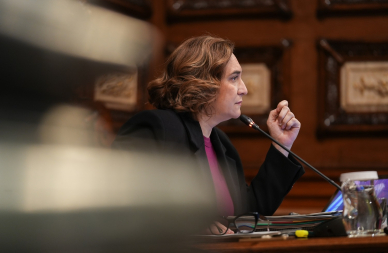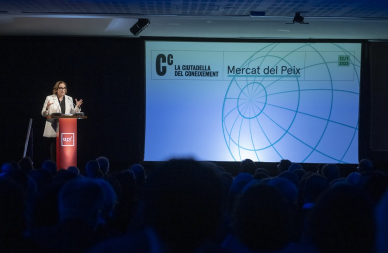24/02/2023
Get to know the Mayor better
Official announcement of the UNESCO Conference on Higher Education 2022
Share it
Speech of the day 29/11/2021
"Knowledge needs values to ensure that the dream of reason drives progress rather than creating monsters. Knowledge must be used to promote well-being, especially the well-being of those most in need, in the pursuit of equity and sustainability."
First of all, on behalf of the city, I would like to thank you for choosing Barcelona to host the World Higher Education Conference 2022, especially as we’re the first city to be chosen to meet in outside Paris, where UNESCO has its headquarters. A warm welcome to everyone.
We don’t think this is a random choice, but feel that it reflects our profile as a benchmark city in higher education, science, culture and knowledge.
This has not always been the case. If you look closely, you’ll see that there’s a metro station called “Universitat”, in the city’s historical centre which is where you’ll find the city’s oldest university, housed in an impressive building. And there’s another station called“Zona Universitària” on the outskirts, at the gateway to other cities.
That’s because for many years the chance to go to university was only for the few. And because during the dictatorship students were kept away from the city centre as the regime knew they were catalysts for change, freedom of thought, and democracy; they were a challenge to the establishment.
That’s why fascism wanted limit access to higher education, locating a university on the periphery of the city, or even outside it, and created the Autonomous University of Barcelona.
Four decades later, the reality is totally different. These universities are still going strong and are well-connected, but today there are campuses and faculties in every district of the city, and we have actively promoted knowledge, science and research.
Over the years, Barcelona has gone from being a city with universities to a university city, a city of research and knowledge creation.
Today
-
Barcelona’s universities have 230,000 students
-
Four of Barcelona’s university centres are among the top 15 in Spain
-
We are the fourth city for research publications in the European Union
-
Two of our business schools are in the world’s top 20
-
BCN is the second most attractive global destination for scientific research centres, according to the Global Cities Investment Monitor 2021
1) Science and the humanities
We are very proud of that balance sheet, and not just because it gives us a competitive advantage. This is important because science and knowledge help us to live better lives, as they are drivers of human progress.
None of the global challenges we face can be solved without the clear and decisive involvement of the scientific community. However, research and science alone are not enough. They need to be based on solid principles, on social commitment and cohesion, on justice, solidarity and sustainability and must be used to achieve these ends.
Two obvious examples are the pandemic and climate change.
The development of vaccines against Covid-19 has involved an unprecedented scientific effort that is gradually enabling us to return to normality. A human achievement that shows what we are capable of when we are clear about our fundamental priorities.
Yet if the vaccines do not reach the whole world, we will be failing dismally as human beings.
Similarly, science has repeatedly shown that climate change is a reality, one that is the product of an economic model that savagely exploits both people and the planet, with increasingly devastating effect. But despite the efforts of the scientific community, nothing can be done without a firm commitment on the part of governments, and the implementation of concrete, decisive measures.
In short, knowledge needs values to ensure that the dream of reason drives progress rather than creating monsters. Knowledge must be used to promote well-being, especially the well-being of those most in need, in the pursuit of equity and sustainability.
Secondly, when we talk about higher education, we must think of knowledge in all its many aspects and disciplines. We need a better understanding of social, humanistic and artistic knowledge, which is just as essential. And this is why we cannot dissociate science from the humanities - a mistake that impoverishes science, impoverishes the humanities, and impoverishes the contribution to human progress. I would also like to take advantage of this occasion to ask that the number of hours devoted to philosophy in secondary education not be reduced.
And thirdly, we need knowledge just as much as we need thought and philosophy. These are often perceived as being the same thing, but this is not so. We need to link knowledge to evidence-based critical thinking in order to combat attempts at manipulation, false beliefs and fake news that feed polarisation and anti-democratic attitudes.
At this point I’d like to highlight the Biennial of Thought, the cultural events that we have promoted in Barcelona to talk about the city, democracy and technology, and also the City and Science Biennial that looks at how to use science to improve our well-being and tackle the challenges we face.
2) Higher education, equality and equity
Without a doubt, when we talk about higher education, research and values, fair and equal access to that education is absolutely key.
Everyone who wants to should be able to access knowledge and higher education, not just those who can afford it. Unfortunately, we are a long way from achieving that goal.
This is why measures like those being promoted by the Spanish Minister of Universities, Manuel Castells such as a reduction in university tuition fees, an increase in student grants and the assurance of equal opportunities in terms of access to higher education are so important. I‘d like to take this opportunity to warmly thank Manuel Castells for all his work.
And Barcelona shares this commitment. A few days ago I was able to personally congratulate the first cohort of young graduates from the Prometheus Programme: a project that breaks down not only economic but also cultural and social barriers, providing young people from the most vulnerable neighbourhoods with the chance to go to university.
I congratulated them wholeheartedly, and told them that the Prometheus Programme is not an advantage, but is rather a compensation for disadvantage. These young women and men have not had it easier than others - in fact quite the opposite. But we can stop it being more difficult for them by correcting injustices.
Because as we all know, university is not as accessible or as easy to get into for someone from a humble, working class family as it is for the son or daughter of a well-off one. Some data from Barcelona itself:
-
Only 10.6% of university students come from working-class families, compared to the 54.5% that are from an upper-class background, and the 34.7% from the middle-class.
-
Students from more humble families are 6 times more likely to need to repeat a year.
What’s more, there is very clearly a barrier in terms of gender as well as of social class:
-
In Catalan universities in 2018, the percentage of male and female students was almost even - 55% and 45% respectively. On the other hand, if we look at university professors, we find that 78% were men, and only 22% were women.
-
Similarly, according to UNESCO’s own data, at present fewer than 30% of the world’s researchers are women.
Higher education must reward effort, but it takes place in an unequal world where there are great imbalances between effort and reward.
Because unfortunately, for many, for millions of people in the world, education is still an unattainable goal, even at the most basic levels. And even more so at higher levels. And even more so if you are a woman. And even more so if you come from a country where basic human rights are not guaranteed, or there is no welfare state.
Unfortunately, the affirmation “you can if you want to” is a fallacy for the majority of the world’s population. Because there is no meritocracy without equity and equality. A more equitable and egalitarian society is also one that makes better use of its human capital. And that way we all, men and women alike, come out winning.
Our responsibility as governments, and that of all the stakeholders in the field of education and knowledge, is to work to reduce these inequalities and thus make it easier for all those who want to study to be able to do so. And to be able to do so throughout their lives.
I hope the work you put into this 3rd World Conference will be very fruitful, and that you can bring us a deeper understanding of these and the other major challenges that we face, so that we can turn higher education into a lever for social change, for expanding rights and well-being.
So on behalf of the city of Barcelona, thank you very much, for choosing us as a university, cultural and scientific capital, something we welcome with great pride and a great sense of responsibility.

